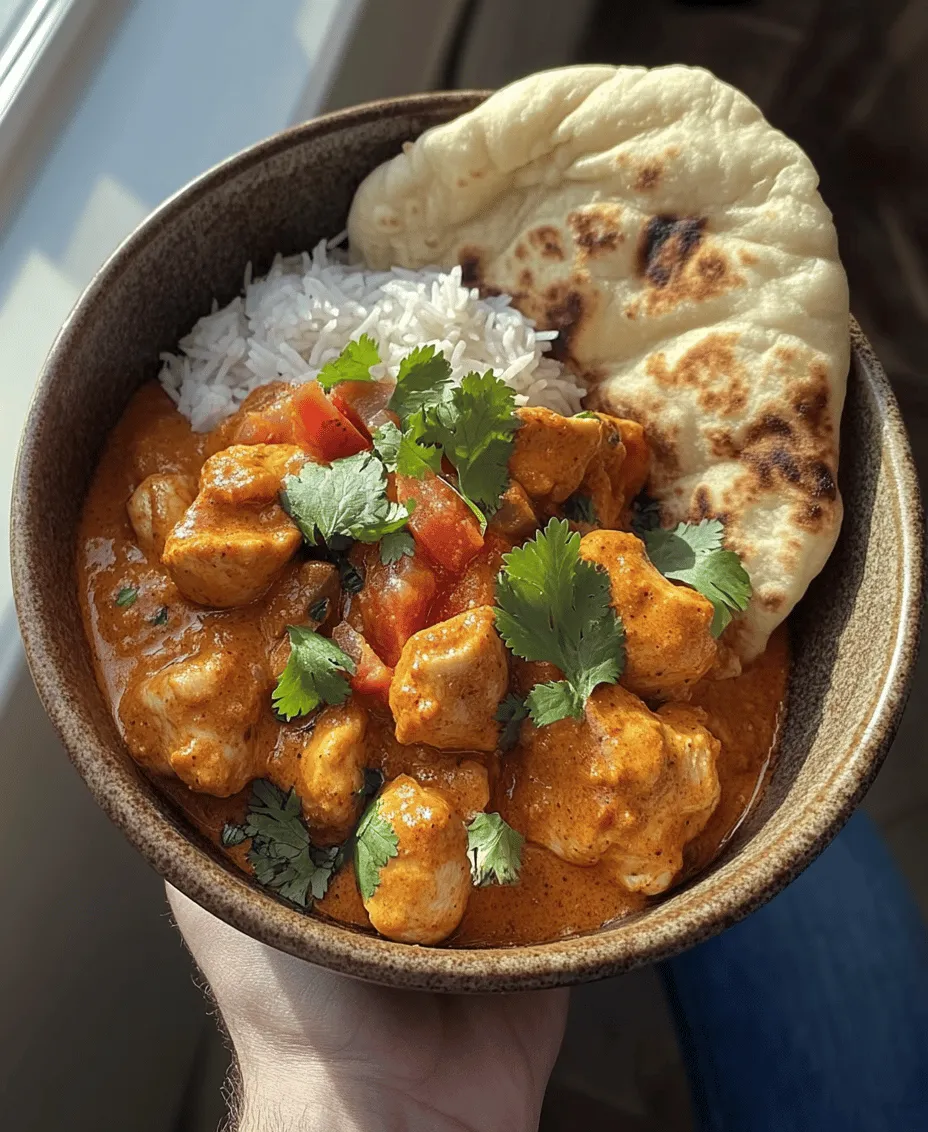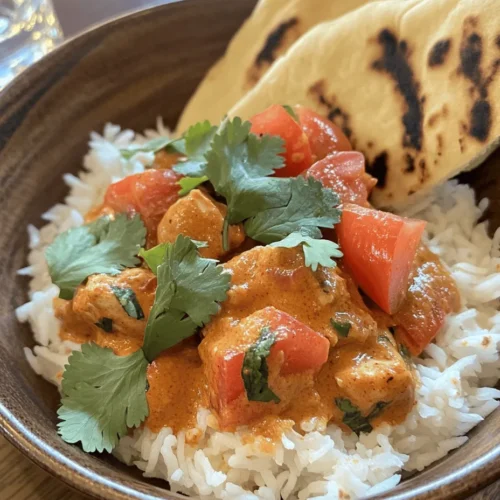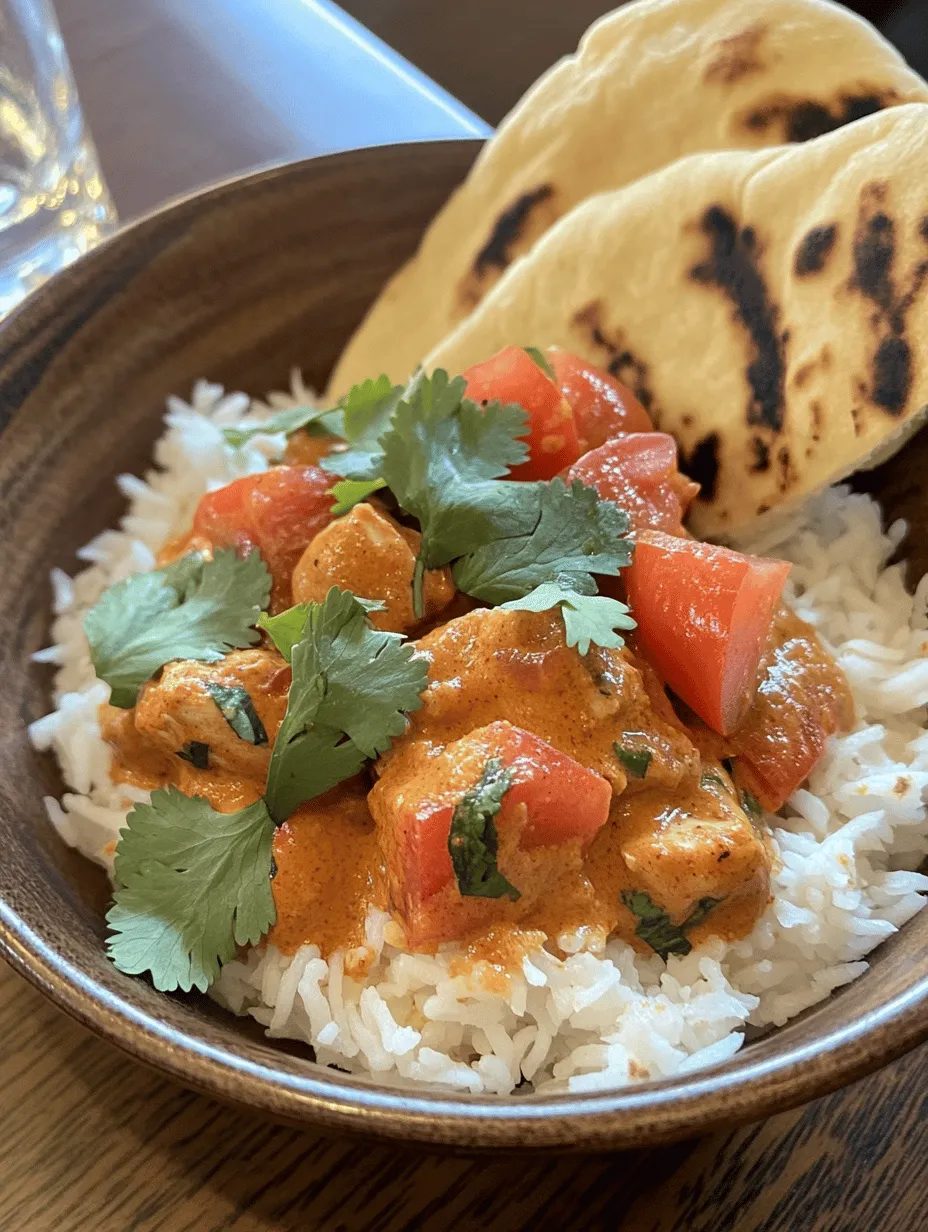Introduction
Dive into the world of Gordon Ramsay’s Chicken Tikka Masala, a dish that has captured the hearts and palates of food enthusiasts around the globe. This vibrant and flavorful recipe encapsulates the essence of Indian cuisine while seamlessly integrating itself into British culture, making it a beloved favorite in many households. With its rich, creamy sauce balanced by a medley of spices, Chicken Tikka Masala is much more than a meal; it’s an experience that transports you straight to the bustling streets of India.
The allure of Chicken Tikka Masala lies in its harmonious blend of flavors. The tender chicken, marinated to perfection, absorbs an array of spices that create a delightful taste sensation. The creamy tomato-based sauce adds a layer of comfort and richness that makes this dish irresistible. Not only is it a staple in Indian restaurants worldwide, but it has also found a prominent place on British menus, often regarded as a national dish. As you embark on this culinary journey, get ready to replicate a restaurant-quality Chicken Tikka Masala right in your own kitchen.
The Essence of Chicken Tikka Masala
To truly appreciate Chicken Tikka Masala, one must understand its origins and evolution. The dish is believed to have been created in the UK by South Asian chefs who sought to cater to the local palate. While its exact origin is often debated, many agree that it emerged in the 1960s, with its first documented appearance in a restaurant in Glasgow. The combination of bite-sized pieces of marinated chicken cooked in a tandoor (a clay oven) and served in a rich, spiced sauce quickly gained popularity, leading to its status as a culinary icon.
Culturally, Chicken Tikka Masala reflects the melting pot of British and Indian culinary traditions. Its adaptability has led to numerous variations, with each region adding its unique twist. From the addition of different spices to variations in creaminess, the dish has evolved while maintaining its essential characteristics. This adaptability has not only made it a staple in Indian cuisine but also a symbol of multiculturalism in the UK. Today, Chicken Tikka Masala can be found in homes and restaurants around the world, representing a fusion of flavors that celebrates diversity.
Ingredient Breakdown
Now that we’ve established the significance of Chicken Tikka Masala, let’s delve into the ingredients that make this dish exceptional. Gordon Ramsay’s recipe emphasizes high-quality components that contribute to the overall flavor and texture of the dish. Two main categories encompass the ingredients: the chicken marinade and the tikka masala sauce.
Chicken Marinade Ingredients
1. Chicken: The star of the dish, boneless chicken thighs or breasts are preferred for their tenderness and ability to absorb flavors.
2. Yogurt: A key player in the marinade, yogurt acts as a tenderizer, breaking down the proteins in the chicken while infusing it with flavor. It also helps create a luscious texture in the final dish.
3. Spices:
– Cumin: Known for its warm, earthy flavor, cumin adds depth to the marinade.
– Coriander: This spice has a citrusy, slightly sweet flavor that complements the other spices beautifully.
– Garam Masala: A blend of various spices, garam masala introduces warmth and complexity to the dish.
– Turmeric: Recognized for its vibrant color and health benefits, turmeric lends an earthy flavor to the marinade.
– Chili Powder: Depending on your heat preference, chili powder adds a kick that balances the richness of the dish.
Tikka Masala Sauce Ingredients
1. Onions: Finely chopped onions are essential for building the sauce’s base flavor. They add sweetness and depth when sautéed until golden brown.
2. Garlic and Ginger: A combination of minced garlic and ginger provides the aromatic foundation for the sauce, essential for achieving that authentic Indian flavor profile.
3. Canned Tomatoes: Using canned tomatoes helps create a rich, tangy sauce that forms the backbone of the tikka masala. They enhance the dish’s color and provide a natural sweetness.
4. Coconut Milk or Heavy Cream: Depending on your preference for creaminess, both options work well. Coconut milk adds a subtle sweetness and a hint of tropical flavor, while heavy cream creates a rich and luxurious texture.
By understanding the role of each ingredient, you can appreciate the careful balance of flavors that makes Gordon Ramsay’s Chicken Tikka Masala so appealing.
Step-by-Step Cooking Instructions
Creating a delicious Chicken Tikka Masala at home may seem daunting, but with Gordon Ramsay’s detailed instructions, it becomes an accessible and rewarding experience. Here’s a step-by-step guide that will ensure your dish turns out perfectly every time.
Marinating the Chicken
1. Prepare the Marinade: In a large bowl, combine yogurt, cumin, coriander, garam masala, turmeric, chili powder, and salt. Mix well to create a smooth paste.
2. Add the Chicken: Cut your chicken into bite-sized pieces and add it to the marinade. Ensure each piece is thoroughly coated to absorb the flavors. Cover the bowl with plastic wrap and refrigerate for at least 1 hour, although marinating overnight will yield even better results.
3. Why Marinate?: The marination process is crucial for developing flavor and tenderness. The acids in yogurt break down the chicken fibers, allowing the spices to penetrate deeply. This step is key to achieving juicy, flavorful chicken that stands out in the final dish.
Cooking the Chicken
1. Preheat the Grill or Skillet: For optimal cooking, preheat your grill or skillet over medium-high heat. A hot cooking surface ensures a beautiful char on the chicken, enhancing the overall flavor.
2. Cook the Chicken: Remove the chicken from the marinade, allowing excess marinade to drip off. Place the chicken pieces on the grill or in the skillet, ensuring not to overcrowd the pan. This allows the chicken to sear rather than steam.
3. Achieve the Perfect Cook: Grill or sauté the chicken for about 5-7 minutes per side, or until the internal temperature reaches 165°F (75°C). The chicken should be nicely browned and cooked through, retaining its juiciness.
4. Set Aside: Once cooked, remove the chicken from the heat and set it aside. It will be added back into the sauce later, allowing it to absorb even more flavor.
Following these initial steps will set the foundation for crafting an unforgettable Chicken Tikka Masala. As you prepare this dish, the aroma of spices will fill your kitchen, promising a delightful culinary experience that awaits you.

Preparing the Sauce
The key to a rich and flavorful Chicken Tikka Masala lies in the sauce, and the initial step involves sautéing onions to perfection. Start by heating a generous amount of oil in a large saucepan over medium heat. Add finely chopped onions, ensuring they are spread out evenly in the pan. The goal is to slowly caramelize the onions, allowing them to soften and turn a golden brown color. This process typically takes around 10-15 minutes, and it is crucial as it enhances the sweetness of the onions, which forms the foundation of the sauce.
Once the onions are beautifully caramelized, it’s time to build on that flavor. Add minced garlic and ginger, followed by diced green chilies. The garlic and ginger not only contribute to the aromatic profile but also add depth to the sauce. Sauté these ingredients for another 2-3 minutes until they release their fragrant oils, filling your kitchen with an irresistible aroma. The addition of chilies will provide a gentle heat that balances the sweetness of the onions, creating a harmonious flavor base.
Spicing It Up
Now that your onion mixture is fragrant and flavorful, it’s time to introduce the spices that will truly elevate your Chicken Tikka Masala. In a separate small dry skillet, toast whole spices such as cumin seeds, coriander seeds, and cardamom pods over medium heat until they become aromatic, usually about 2-3 minutes. This technique releases their essential oils, intensifying their flavors and enhancing the overall profile of the dish.
Once toasted, you can grind the spices using a mortar and pestle or a spice grinder. Add the freshly ground spice mixture to the sautéed onion, garlic, ginger, and chili mixture, stirring well to combine. Following this, pour in a can of crushed tomatoes, allowing them to mingle with the spices. The acidity of the tomatoes will balance the sweetness from the onions, creating a well-rounded sauce.
Finishing Touches
At this stage, it’s essential to let the sauce simmer for about 15-20 minutes. This simmering process allows the flavors to meld beautifully, resulting in a rich and cohesive sauce. As the sauce cooks, it will thicken, and the vibrant flavors will intensify.
To achieve that signature creamy texture synonymous with Chicken Tikka Masala, incorporate coconut milk or heavy cream towards the end of the cooking process. Stir it in gently, allowing it to blend seamlessly with the sauce. This addition not only enriches the flavor but also creates a luscious consistency that clings to the chicken and elevates the overall dish. After simmering for a few more minutes, your sauce will be ready to embrace the marinated chicken.
Serving Suggestions
When it comes to serving Chicken Tikka Masala, there are several delightful accompaniments that enhance the dining experience.
Rice Options
Basmati rice is the traditional choice for serving alongside Chicken Tikka Masala. Known for its long grains and aromatic qualities, basmati rice absorbs the sauce beautifully, making each bite a flavor-packed experience. Its fluffy texture and subtle nuttiness complement the rich sauce without overpowering it. You can enhance the rice further by cooking it with a few whole spices like cloves and cardamom, which will infuse additional flavors.
Bread Pairings
Naan bread is another classic accompaniment that pairs perfectly with Chicken Tikka Masala. This soft, pillowy bread is perfect for scooping up the sauce, allowing you to enjoy every last drop. You can opt for plain naan, garlic naan, or even cheese naan, depending on your preference. The warm, slightly charred exterior provides a delightful contrast to the creamy sauce, making for a satisfying and comforting meal.
Garnishing Techniques
To elevate the presentation of your Chicken Tikka Masala, consider garnishing the dish with fresh cilantro or mint leaves. A sprinkle of chopped cilantro not only adds a burst of color but also introduces a fresh flavor that brightens the dish. Additionally, a drizzle of cream or yogurt on top can create an appealing visual contrast and adds an extra layer of richness.
Nutritional Insights
Chicken Tikka Masala is not only a feast for the senses but also a nutritious meal option. Typically, a serving of Chicken Tikka Masala provides a good source of protein, thanks to the chicken, while the spices offer various health benefits. The sauce, often made with coconut milk or cream, contributes healthy fats that support heart health when consumed in moderation.
For those with dietary restrictions, there are several modifications you can make. To create a lower-fat version, consider using low-fat yogurt or coconut milk instead of cream. For a vegetarian alternative, substitute the chicken with paneer or chickpeas, maintaining the delicious flavors of the sauce. These adjustments allow everyone to enjoy this beloved dish, no matter their dietary preferences.
Conclusion
Making Gordon Ramsay’s Chicken Tikka Masala is not just about following a recipe; it’s about embracing the culinary journey that brings together rich flavors and cultural significance. From the caramelization of onions to the careful toasting of spices, each step contributes to the complexity of this beloved dish. As you savor the final creation, remember the joy of cooking and sharing meals with loved ones.
This dish embodies warmth and comfort, making it perfect for gatherings or family dinners. Whether you’re enjoying it with fragrant basmati rice, warm naan bread, or a sprinkle of fresh herbs, Chicken Tikka Masala is sure to impress. So, gather your ingredients, don your apron, and dive into the rewarding experience of mastering this classic recipe. You’ll not only enjoy the delicious outcome but also take pride in having crafted a dish that resonates with rich culinary traditions. Enjoy the process, and happy cooking!



